|
|
|
Sort Order |
|
|
|
Items / Page
|
|
|
|
|
|
|
| Srl | Item |
| 1 |
ID:
140496
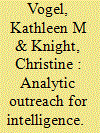

|
|
|
|
|
| Summary/Abstract |
This article describes a new effort to engage in analytic outreach between academic scholars and intelligence analysts on the issue of emerging biotechnology threats to US national security. The context of this outreach was a September 2012 meeting in London to explore possibilities for enhanced analytic outreach in relation to emerging biotechnology threats, supported by the UK Genomics Policy and Research Forum. This meeting consisted of a mix of current and former intelligence practitioners and policy officials, and social science and scientific experts, from both the UK and the US. As will be described below, this unique pairing of experts and subjects revealed new insights into how to improve intelligence assessments on biotechnology and bioweapons threats. It also revealed continuing challenges in reforming assessments within existing intelligence work routines.
|
|
|
|
|
|
|
|
|
|
|
|
|
|
|
|
| 2 |
ID:
164195
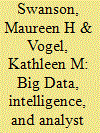

|
|
|
|
|
| Summary/Abstract |
The Laboratory for Analytic Sciences (LAS) at North Carolina State University, funded by the National Security Agency, is a collaborative, long-term research enterprise focused on improving intelligence analysis using Big Data. In its work, LAS has recently begun dealing with the trade-off between the collection, storage, and use of large unclassified data-sets and analyst privacy. We discuss particular privacy challenges at LAS, analyze privacy principles in the life cycle of LAS unclassified data-sets, what intelligence analysts themselves think about these privacy concerns, and recommend possible best practices potentially applicable to LAS, as well as future Big Data laboratories and research centers that collaborate with intelligence communities.
|
|
|
|
|
|
|
|
|
|
|
|
|
|
|
|
| 3 |
ID:
127889
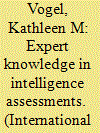

|
|
|
|
|
| Publication |
2013.
|
| Summary/Abstract |
In 2011, scientists in the Netherlands and Japan announced that they had created a modified variant of the H5N1 avian influenza virus that was transmissible via aerosol, raising fears of a new, highly lethal H5N1 virus that could cause a deadly global pandemic. Soon, government officials and the media were raising alarms about the wisdom of publishing such experimental methods and results in the open scientific literature. Their concerns sparked a large public controversy about the H5N1 experiments and their potential publication. In the midst of this controversy, U.S. intelligence analysts began assessing the potential security implications of the H5N1 manuscripts, including whether a terrorist, criminal, or state could easily replicate these experiments and create mutated viruses for bioweapons use. An in-depth look at this controversy reveals that, first, U.S. intelligence analysts do not have adequate social and material resources to identify and evaluate the tacit knowledge, or know-how, that underpins dual-use experiments such as those in the H5N1 case. Second, they lack dedicated structures and methods to understand the politics that characterize the use of technical expertise in such controversial biosecurity issues. Third, they require new types, structures, and uses of expert knowledge to enable them to make more informed and balanced assessments of biosecurity threats.
|
|
|
|
|
|
|
|
|
|
|
|
|
|
|
|
| 4 |
ID:
169009
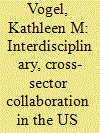

|
|
|
|
|
| Summary/Abstract |
How does one design and sustain interdisciplinary, cross-sector collaboration to improve intelligence results for twenty-first century security threats? This paper will analyse five past and present initiatives designed to create interdisciplinary, cross-sectoral collaboration within different agencies of the US Intelligence Community (IC). We will discuss key features of each effort, their successes and challenges, identify common themes and, propose which collaborative model might be most advantageous for a particular type of project based on project constraints. In so doing, we provide direction for IC leaders seeking to improve academia–industry–intelligence partnerships for future planning on intelligence-funded collaborations.
|
|
|
|
|
|
|
|
|
|
|
|
|
|
|
|
| 5 |
ID:
182952
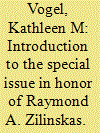

|
|
|
|
|
| Summary/Abstract |
I first met Ray Zilinskas in 1998, when I was fresh out of graduate school, a young and impressionable postdoc in the Chemical and Biological Weapons Nonproliferation Program at the Center for Nonproliferation Studies, Monterey Institute of International Studies, as it was then known. When we were first introduced, I was a bit intimidated, as he was a well-known former bioweapons weapons inspector in Iraq, but Ray was always gracious and kind. He had a heart for students and young scholars, always welcoming newcomers into the “Monterey Mafia.”
|
|
|
|
|
|
|
|
|
|
|
|
|
|
|
|
| 6 |
ID:
162732
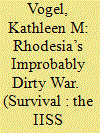

|
|
|
|
|
| Summary/Abstract |
Glenn Cross’s account of Rhodesia’s use of biological weapons suggests that even taboo weapons remain attractive as military equalisers.
|
|
|
|
|
|
|
|
|
|
|
|
|
|
|
|
|
|
|
|
|